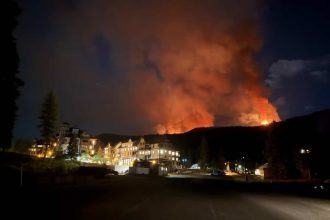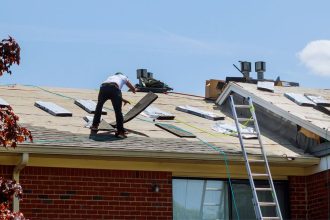Zohran Mamdani stormed to victory in the New York City mayoral elections with a pledge to improve the quality of life for the city’s eight and half million residents.
The Democrat’s flagship proposals – including universal childcare, free bus travel and city-run grocery stores – have resonated with many squeezed New Yorkers who have grappled with a crippling cost of living crisis for years.
But one proposal that has drawn vocal opposition from not only landlords but economists who believe the policy will backfire is a pledge to freeze rents.
Since 2019, average rent prices in New York have surged by 36pc to a record $3,700 a month, leaving the city increasingly unaffordable. The average New Yorker now spends around 60pc of their salary on rent, according to figures from Realtor, compared to around 40pc for Londoners.
It was in this context that Mamdani pitched a four-year freeze on rent increases as his signature policy proposal, alongside a longer-term plan to boost New York’s housing stock.
Under the policy, rent increases for all one million of the city’s rent-stabilised properties – apartments generally built before 1974 whose rises are determined each year by a mayor-appointed board – would be halted. This would affect around half the city’s rentals, which house more than two million New Yorkers, Mamdani claimed.
If passed, it will not be the first time rent freezes have been imposed on New York. Under Bill de Blasio, Mamdani’s predecessor, the policy was enacted three times in 2015, 2016 and 2020 to preserve affordable housing amid “unreasonable rent hikes”.
While the then-mayor’s allies praised the policy for alleviating the burden of higher rents on New Yorkers, others wrote it off as a short-term fix that ultimately threatened to make the issue worse over the longer term. They may have been right: median citywide rents have risen 41pc in the decade since the first one-year freeze.
Today, Mamdani faces similar criticism.
Jen Sidorova, a policy analyst at the Reason Foundation, a think tank, says the new mayor’s rent freeze proposals helped give him political capital when he needed it, despite the obvious drawbacks of the policy.
“[The policy] is glamourised within the context of New York City,” she says.
“It’s an emotionally charged issue and it gives the illusion of instant action. But the real long-term economic impact will unravel years down the road.”
One of the main problems of rent freezes is their impact on both the supply and quality of housing stock.
When Mamdani announced the policy in a video TikTok, he claimed that rent-stabilised landlords were “doing just fine” with a median income of $60,000 a year.
But Ann Korchak, board president of the Small Property Owners of New York (Spony), says this fails to reflect a large section of the market which comprises small landlords whose profits have already been squeezed over the past decade.
“It would be catastrophic,” she says. “Small rent-stabilised buildings still haven’t recovered from three years of Mayor Bill de Blasio rent freezes and the restrictions of the Housing Stability and Tenant Protection Act of 2019.
“They need rent increases to keep up with constantly rising property taxes, insurance premiums, utilities and all other building operating costs – or they are at risk of landing on the city’s lien sales list.”
Figures from Spony show that every year since 2015, when the first rent freeze was introduced, inflation has consistently risen quicker than landlords have been permitted to raise rents.
This threatens the quality of rentals, as landlords have less income to spend on maintenance, and risks driving a surge in “warehousing”, whereby rental properties are taken off the market to avoid penalisation for falling below the minimum requirements for upgrades.
More than 50,000 apartments in New York are estimated to be empty as a result – housing stock that, if put back on the rental market, could help ease price rises.
Sidorova says that ultimately, it is renters who will lose out: those in rent-controlled properties will cling to worsening properties that aren’t right for them because they know the rent won’t rise; while those in the other million or so “market-rate” properties will see prices climb as competition ramps up.
“People are not going to leave rent-stabilised units. They’re like gold right now,” she says. “It will put upward pressure on the market.
“We’re going to see some landlords suffer, but the people who are going to suffer the most are tenants.”
Not everyone agrees. Oksana Mironova, a senior policy analyst with the Community Service Society of New York, noted in 2020 that earlier rent freezes had reduced the number of tenants falling behind on rent by up to nine percentage points from around 27pc.
Although landlords might have experienced rising costs during the freeze, she pointed out that wages had also stagnated for many low-income households, making it increasingly difficult for them to make ends meet.
Mairi MacRae, of housing charity Shelter, says rent controls can help redress any imbalances that may exist between landlords and tenants.
“With the threat of eye-watering rent increases hanging over them, many renters will feel forced to keep quiet about poor conditions or risk losing their homes,” she says, adding that setting fair limits during a tenancy can “truly make renting more secure”.
Yet following Mamdani’s mayoral victory, some in Britain fear that a similar policy of rent control could make its way across the pond, carrying heavy implications with it for the rental market.
London Mayor Sir Sadiq Khan, who reportedly called to congratulate Mamdani on his victory in the primary mayoral elections, has long pressured the Government for the power to control rents.
He renewed his push in September, telling members of the London Assembly it was now top of his wish-list of devolved powers.
But, as in New York, industry experts are sceptical that such a policy will help renters.
Gary Hall, head of lettings for estate agent Knight Frank, says Khan risks exacerbating the exodus of landlords – which will in turn hurt renters.
“Landlord-bashing has been going on for quite a few years,” he says. “We need an environment where we’re attracting landlords. Something like rent controls would be another part that will make it less appealing.”
A spokesman for the Mayor of London said: “The Mayor has consistently stood up for London’s renters, calling for rent controls, more support for key workers, better rights and protections, and stronger action against unscrupulous landlords who fail to ensure their properties meet basic safety standards.”









